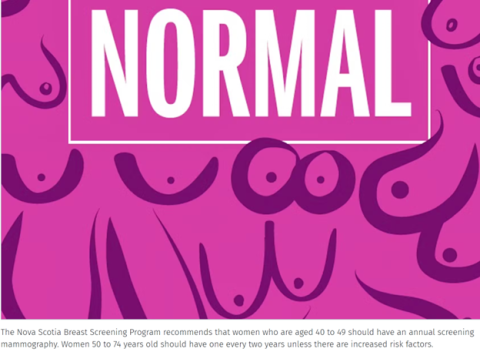October is breast cancer awareness month. According to the Government of Canada, one in eight women are expected to develop breast cancer during their lifetime and one in 34 will die of it. When breast cancer is detected early, it leads to better outcomes, says Sherrie Coldwell, the program coordinator for the Nova Scotia Breast Screening Program.
Mammograms
One way to help with this early detection is by having a mammogram, says Coldwell.
“If cancer is present, we want to find it early as possible to increase your chances of a better outcome,” she says.
The Nova Scotia Breast Screening Program recommends that women who are aged 40 to 49 should have an annual screening mammography. Coldwell says that women 50 to 74 years old should have one every two years unless there are increased risk factors such as:
• Family history of first degree relative (mother, sister, daughter, father, brother, son)
• Evidence of high risk, such as genetic predisposition or radiation therapy to chest wall
Those who are 74 years and older are eligible for screening every two to three years if they are in good health.
If you have increased risk factors, Coldwell says to talk to a primary care provider to determine how often you should be screened.
Be Breast Aware
Even if you are getting regular mammograms, Coldwell says it’s still important to be breast aware. This means knowing your own normal, which allows you to have any changes investigated more quickly.
“Although mammograms are the most reliable method of early detection of breast cancer, not all cancers may be seen on a mammogram,” says Coldwell.
Cancers can also develop between mammograms as well, she adds. This is why is very important to return at the recommended interval so radiologists can look for subtle changes between exams.
Self Exams
To be breast aware, and to complete a self-exam, Coldwell says you should touch and look at your breasts regularly, so you know how they normally look and feel. Even take notice of any changes that are part of your regular cycle. Knowing your breasts will help you spot any changes quickly, explains Coldwell.
All new breast changes should be checked out by your health care provider even if you have recently had a normal mammogram, she says. Not all new breast changes are cancerous, but they do need to be assessed to ensure they are normal.
When assessing your breasts you should be aware of:
• A new lump in the breast
• Thickening or hardening of the skin
• Bloody or clear fluid leaking from the nipple
• A change in the look or feel of the skin, such as puckering or dimpling
• Redness, thickening, and pitting of the skin like the skin of an orange
• A change in the size, shape, or appearance of the breast
• A change in nipple position such as the nipple being pulled in or pointing differently
• Peeling, scaling, crusting, or flaking of the area around the nipple.
“It is very important to be aware that breast cancer does not only present as a lump and to be aware of the other changes to watch for,” notes Coldwell.
If you feel there is something abnormal or there are changes with your breast health, Coldwell says it’s important to be assessed by a primary care provider. If your primary care provider feels further investigation is required, they will refer the patient for diagnostic imaging.
At this point, self-referring for a screening mammogram when you know you have symptoms is not the right path and can delay the time it takes for diagnosis, she explains.
Again, Coldwell urges the importance of having a screening mammogram at the recommended interval as this increases the chances of early detection. Early detection allows for better treatment options, it is less likely to have spread and has better outcomes.
If you don’t know if you are eligible for self-referral screening visit nsbreastscreening.ca to fill out the breast screening eligibility questionnaire to see if you qualify.
